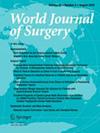Meaningful engagement of people living with cancer: Leveraging breast cancer survivors in a stigma reduction intervention in Tanzania.
IF 2.3
3区 医学
Q2 SURGERY
引用次数: 0
Abstract
INTRODUCTION Cancer-related stigma is a key driver of advanced breast cancer stage in Sub-Saharan Africa (SSA). We developed and tested the impact of a breast cancer survivor-led Stigma reduction intervention (SRI) on stigma and treatment adherence of newly diagnosed patients with breast cancer in Tanzania. METHODS Breast cancer survivors were trained on breast cancer knowledge and motivational interviewing. A total of 4 trained survivors delivered a SRI (standardized flipchart breast education talk, personal testimony, and motivational interviewing) to 30 newly diagnosed patients with breast cancer before treatment. Pre- and post-intervention knowledge surveys and stigma scale surveys were analyzed via Fisher's exact test and Wilcoxon rank-sum tests. A discussion was held with a group of survivors after the intervention period to elicit feedback on their intervention experience. RESULTS Among the 30 patients, breast cancer knowledge (median overall percent correct) increased from 28% (IQR: 18%-45%) to 85% (IQR: 79%-88%) (p < 0.001) and stigma (median score) decreased from 75 (IQR: 57-81) to 53 (IQR: 44-66) (p < 0.01) following the intervention. All participants were willing to pursue hospital-based treatment after undergoing the intervention. Eighty-seven percent (n = 26) initiated treatment at 8-week follow-up after the intervention. All survivors endorsed feeling empowered and valued in their role in this intervention. CONCLUSIONS Breast cancer survivors are a powerful group to combat the lack of knowledge and stigma in community and healthcare settings. Expanding the scope and scale of this intervention holds promise for improving treatment-seeking behavior and ultimately breast cancer outcomes in SSA.癌症患者的有意义参与:在坦桑尼亚,利用乳腺癌幸存者进行减少污名化干预。
简介在撒哈拉以南非洲地区(SSA),与癌症相关的耻辱感是导致乳腺癌晚期的主要原因。我们开发并测试了由乳腺癌幸存者主导的减少污名化干预措施(SRI)对坦桑尼亚新确诊乳腺癌患者的污名化和坚持治疗的影响。共有 4 名经过培训的幸存者在治疗前为 30 名新确诊的乳腺癌患者提供了 SRI(标准化挂图乳腺教育谈话、个人见证和动机访谈)。通过费雪精确检验和 Wilcoxon 秩和检验对干预前后的知识调查和耻辱感量表调查进行了分析。结果干预后,30 名患者的乳腺癌知识(总正确率中位数)从 28% (IQR: 18%-45%) 上升到 85% (IQR: 79%-88%) (p < 0.001),耻辱感(中位数)从 75 (IQR: 57-81) 下降到 53 (IQR: 44-66) (p < 0.01)。所有参与者在接受干预后都愿意继续接受医院治疗。在干预后 8 周的随访中,87% 的参与者(n = 26)开始接受治疗。结论乳腺癌幸存者是一个强大的群体,他们可以在社区和医疗机构中消除知识匮乏和耻辱感。扩大这一干预措施的范围和规模有望改善寻求治疗的行为,并最终改善撒哈拉以南非洲地区的乳腺癌治疗效果。
本文章由计算机程序翻译,如有差异,请以英文原文为准。
求助全文
约1分钟内获得全文
求助全文
来源期刊

World Journal of Surgery
医学-外科
CiteScore
5.10
自引率
3.80%
发文量
460
审稿时长
3 months
期刊介绍:
World Journal of Surgery is the official publication of the International Society of Surgery/Societe Internationale de Chirurgie (iss-sic.com). Under the editorship of Dr. Julie Ann Sosa, World Journal of Surgery provides an in-depth, international forum for the most authoritative information on major clinical problems in the fields of clinical and experimental surgery, surgical education, and socioeconomic aspects of surgical care. Contributions are reviewed and selected by a group of distinguished surgeons from across the world who make up the Editorial Board.
 求助内容:
求助内容: 应助结果提醒方式:
应助结果提醒方式:


